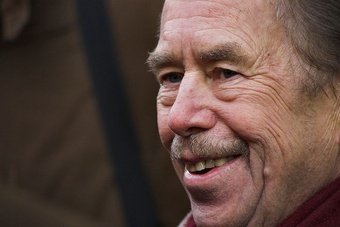
Václav Havel
He comes from a family of entrepreneurs. During the Prague Spring he was active within the Club of Independent Writers and the Club of Committed Non-Partisans. With the ascent of the so-called normalization, which followed the repression of the Prague Spring in 1968 with the invasion of the country by the armies of the Warsaw Pact, he was banned from the theater. In 1975 he founded the samizdat typewritten publishing line for independent literature: Edice Expedice. He systematically protested against political repression. In 1975 he wrote an open letter to the president Gustav Husak and the culmination of his activities was the publication of the Charter 77 in January 1977. These political activities cost him 5 years of his life spent in jail. He was adopted by the international organization for human rights Amnesty International as a so-called prisoner of conscience.
In November 1989 he became the leading representative of the Velvet Revolution and on December 29th 1989 he was elected the first non-communist Czechoslovak President in 40 years by the communist Federal assembly.
He was elected President a second time in free elections on July 5th 1990. When it became clear that the Federation with Slovakia was headed for separation, he resigned from his function on July 20th 1992 and stepped away from political life for several months. On the 26th of January 1993, the Chamber of deputies elected Vaclav Havel as the first President of the Czech Republic. Together with his brother Ivan Havel he was restituted the Lucerna Palace in Prague. In 1992 Ivan Havel signed his share over to his wife Dagmar[1]. Following various legal disputes, Vaclav Havel sold his share in 1997 to the company (Chemapol Reality) for 200 million crowns, 50 millions of which he gave to the newly founded Foundation Nadace Dagmar a Václava Havlových VIZE 97[2].
In 1996 his wife Olga died, while he was himself fighting against a severe tumor. In 1997 he married the actress Dagmar Veškrnova. In 1998 he was once again elected President. He left the presidential post at the end of
his second presidential term on the 2nd of February 2003. His successor was former Prime Minister Václav Klaus.
In the second half of his presidential term he modified his until then rather pacifist posture and expressed several times his support for military interventions, in particular the offensive of the NATO in Yugoslavia and the war of the USA in Iraq.
He was perceived somewhat controversially in his presidential office. One of his first moves was a wide amnesty, which led to the freeing of two thirds of prisoners imprisoned for criminal charges (political prisoners had been freed even before he took over his post). A great part of the Czechs didn’t agree for example with the number of pardons granted, nor with the granting of pardons that interfered with trials against Havel’s acquaintances. Havel’s popularity with the public decreased when he married Dagmar Veškrnova. His political opponents, for ex. Václav Klaus, reproached Havel his too active interferences in daily politics, he condemned in particular his active involvement in the formation of governments (in particular the formation of the caretaker government led by Josef Tosovsky in 1997), the use of the presidential veto and other powers. Another sore point was the backstage political administration, the support to so-called parties of the Castle (KDU-ČSL, Unie Svobody) or Havel’s support to civic society.
While in the Czech Republic, his popularity tended to decrease during his presidential appointment, it didn’t influence his renown abroad. Havel deservedly remained the symbol of the fight for freedom and democracy, he was repeatedly nominated for the Nobel Peace Prize. Former United States Secretary of State Madeleine Albright said about Vaclav Havel: “President Havel has made Czech people very proud, certainly made me very proud of having been born Czech, and I think he will be very, very missed on the international scene. […] To a lot of people, the words Havel and Czech are synonymous. Havel really put Prague and the Czech Republic on the map in the post Cold War period.”







